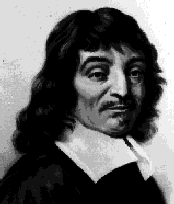
René Descartes
Sam and Anne in the Promised Land:
Re-Thinking "Being"
ADalke/SDalke
A dialogue triggered by Grobstein's
Writing Descartes ...

Promised Land State Park
 René Descartes |
Sam and Anne in the Promised Land: |  Promised Land State Park |
During a long hike around Egypt Lake last weekend, Sam and Anne took up again this "matter" of Descartes. Sam, who had read Meditations on First Philosophy in a course on Global Wisdom at Haverford last fall, offered his mother an alternative interpretation of the text--one which highlighted Descartes' investment in the existence both of God and the human soul. He called her attention to the fact that Descartes begins the Meditations, addressed to the Dean and Doctors of the Sacred Faculty of Theology of Paris, by saying the the two questions of God and the soul are the principal ones needing demonstration by rational philosophy rather than theology. In other words, Descartes sets out to demonstrate a certain truth, by thinking his own way toward it, and without relying on the received wisdom of the church. So far, so good.
But the experiment gets very shaky very quickly. In seeking valid demonstrations for the existence of God and the human soul, Descartes is aiming (and, not surprisingly, arriving) at a very particular end: proof for ideas in which he is heavily invested. (Bells going off here, at the reminder that scientists need to be particularly skeptical about the data that demonstrates what they WANT it to prove....) A keynote throughout the Meditations is actually the "finite and limited" nature of our minds. Descartes places great emphasis (and spends considerable time lamenting) the "imperfection" of the self, observing that its errors are the result of "deficiency," the result of reaching, willfully, beyond what we fully understand. Contra those philosophical pragmatists-to-come (who explain the logic and wisdom of acting on the basis of incomplete knowledge), Descartes advises acquiring the habit of not erring, by vowing "never to pass judgment upon things whose truth is not clearly known."
What particularly surprised Anne, as Sam walked her through the Meditations, was where Descartes located the alternative to such "unclearness" and "instability. "I," for Descartes, is "soul, by virtue of which I am what I am": that is, he defines the essential self, the substantive self, as the "immortal portion"--so clearly distinct, and thus easily separable from, that which is mortal--the body. The mind is "just" an agent in this "proof": in Paul's terms, Descartes is using "thinking" to demonstrate the fundamental "being" of humans: his goal is to demonstrate the certainty of "treeness." Paul suggests (to him and others), that it is not thinking that is the sine qua non of being but the other way around. We are, and (because of what we are) we can think.... Contra Descartes' claim that "I knew nothing to pertain to my essence except that I was a being which thinks, that is, a being having in itself the faculty of thinking," Paul argues that it is the structure of "beingness" (which he calls "treeness") that enables our "thinkingness": so he tells Descartes--who uses "thinkingness" to prove the existence of "beingness"--that he's got it all backwards.
I want to try another formulation, one that is interested less in such chronologies regarding what comes "first" than in the loopy nature of the relation between them--and its particular engine: that which keeps us moving back and forth between "being" and "thinking." Out of these dialogues, I'm getting a clear understanding that "to think" is to have an awareness of self--a sense of doubleness, the ability to see ourselves (as Elizabeth Catanese has said) as "characters in a novel," able not only to observe ourselves feeling and acting, but to imagine (and feel and act) otherwise, to do something other than what we are doing. To "be," in contrast, is to immerse ourselves in the present, to be entirely engaged, without the doubleness and doubt that such a sense of "otherness" engenders. So--what gets us going, and perpetuates the going back-and-forthness, between observation and immersion? I want to propose that it's humor, which lays out a very accessible bridge between thinking and being, moving us from the tragedy of what must inevitably be to the comedy of what might, just MIGHT, happen....
So: first (two) questions in this analysis are: "What is the relationship between humor and thinking? And between humor and being?" I can imagine (at least) three answers:
A particularly acute explanation of the ways in which playfulness can open us to new possibility is Adam Phillip's book On Flirtation, which he describes as "a productive pleasure, keeping things in play, letting us get to know them in different ways, allowing us the fascination of what is unconvincing." His is a book about "the possibilities of flirtation, its risks and instructive amusements--about the spaces flirtation opens in the stories we tell ourselves, particularly within the framework of psychoanalysis."
At a place like Bryn Mawr, which prides itself on offering a rigorous education, students are often particularly hesitant to speak out in class, afraid that they will "get it wrong" and so be publicly corrected; they are particularly hesitant to raise questions that have agreed-upon, politically correct answers. I try to address such hesitations and disinclinations by making my classes into spaces of structured play where, if such deliberative self-censure happened less frequently, we might arrive at some unexpected places, worth examining. I model my courses on the playground that is Serendip, with an awareness that acknowledging a productive variability in brain function and behavior calls for a pedagogy that substitutes, for the more conventional positioning of one's interpretations within a disciplinary structure, a deliberative, intentional search for the serendipidous. To do so is not to try and "correct" what Descartes sadly calls the "errant wandering" of our minds, but rather to enjoy and exploit it.
In an essay on "Play, Games, Sports and Athletics," Donald Siegel observes that the experimental quality of play, an "original and basic. . . fundamental phenomenon of existence," both enables individuals to experiment with finding ways out of situations in which they appear to be "stuck" and serves "society's need for innovation." Its psychological rewards are intrinsic in the doing, rather than in the "exchange value" of what is produced by playing; when players are totally absorbed in a game, they (not so) paradoxically both lose a sense of self-consciousness and feel "in control" of what they are doing: "a sense of ego is lost but concentration is vastly increased."
The process of playfully exploring in the classroom has both a communal nature and a profoundly destabilizing quality. Students are invited, both on Serendip and in my classes, to see and experience themselves as porous, radically labile creatures, lacking a certain fixedness, and radically prone to alteration. The experience of "inwardness" to which both Serendip's forums and such classes invite them is constantly open to change by its culture, insistently under renovation because of interactions with its environment.
As a way of highlighting the absence, so far, of attention to the role that playfulness has played in the exploration of new territories that has been these dialogues, I want to try my hand again at some playwrighting. While Sam and I were hiking around Promised Land...
back at Bryn Mawr, the fledging playwright to whom Anne had dedicated her first laborious venture into playwriting wrote ,
Hi, Anne.
Taking a leaf from Paula's playbook, and emboldened by Sam's reinterpretation of Descartes earnest search for the certainty of "soul," Anne manfully tried again to resurrect an alternative patron saint for both Writing Descartes and Serendip: the skeptic and satirist Cyrano de Bergerac, for whom (unlike Descartes) chance--and its enactment in humor--was the main thing.
In this scene, Rostand's well-known (but historically inaccurate) character de Bergerac takes off his mask to reveal the "real" man, who steps center stage and says,
You marvel that this matter, shuffled pell-mell at the whim of Chance, could have made a man, seeing that so much was needed for the construction of his being....But you must realize that a hundred million times this matter, on the way to human shape, has been stopped to form now a stone, now lead, now coral, now a flower, now a comet; and all because of more or fewer elements that were or were not necessary for designing a man. Little wonder if, within a infinite quantity of matter that ceaselessly changes and stirs, the few animals, vegetables, and minerals we see should happen to be made; no more wonder than getting a royal pair in a hundred casts of the dice. Indeed it is equally impossible for all this stirring not to lead to something; and yet this something will always be wondered at...how small a change would have made it into something else.
If there is something you men cannot understand, you either imagine that it is spiritual or that it does not exist. Both conclusions are quite false. The proof of this is the fact that there are perhaps a million things in the universe which you would need a million quite different organs to know. Myself, for example, I know from my senses what attracts the lodestone to the pole, how the tides pull the sea, what becomes of an animal after its death.
Bridges belong to no one....because a bridge has to belong to two parties, one on either side. There has to be an agreement, a mutual consent, otherwise it's a useless piece of wood, a wasted expanse of cement. Every bridge is, in this way...a monument to an accord (Monique Truong,
The Book of Salt, p. 92).
I finally read your play maps and Sam's interesting response. I must confess that what I enjoyed the most was the technical questions it raised, how to solve staging problems, how to use multi-media, how to keep the public interested, how to appeal to a broad audience, etc. As it is, there's too much stuff in there, no clear points to an outside audience, no tension in the story, necessary to keep people awake. It's very difficult to write about specialized themes in a way that is both meaningful and interesting. Most people do not know the characters and they are too many to introduce properly. What I would do: choose just a few characters and focus the discussion around a defined theme (all the other themes and musings can be made to fall within). The most promising scene for this, the one that interested me the most, is the story of Bergerac vs. Descartes.
We laugh, and thereby can change the world.
Una's inner reply: "Yes--but that is only one way.
There are many ways. We choose."

\ René DescartesWith this speech, de Bergerac clearly earns the right to replace Descartes as patron saint of the current conversation, and of the playground wherein it plays out. Born a quarter of a century after Descartes, de Bergerac was a satirist--and one of the objects of his satire was Descartes' idea that animals are soulless machines. De Bergerac's most striking literary gambits involved space travel; he used imaginary visits to the moon and sun to satirize both politics and people. Such travel was also a marvelous way for him to express a sense of a larger (=God's eye?) perspective than would be possible if one stayed grounded on earth:
Savinien Cyrano de Bergerac 
Building Two-Way Bridges:
A Conversation about Gender and Science
| One Woman's Exploration
| Writing Descartes Home Page
| Descartes Forum
| Science in Culture
| Serendip Home
Send us your comments at Serendip
© by Serendip 1994-2004 - Last Modified:
Friday, 20-Aug-2004 11:18:33 EDT